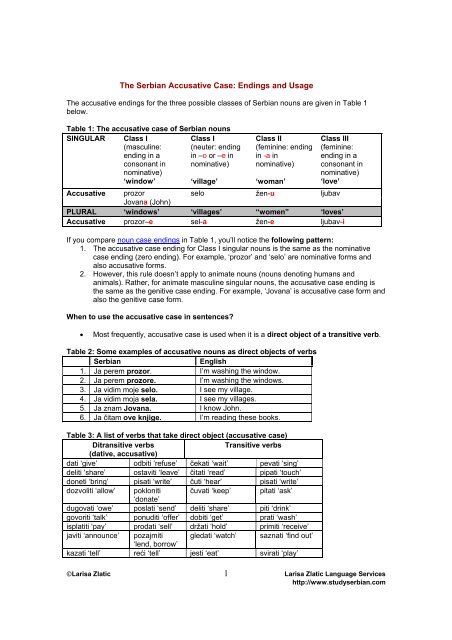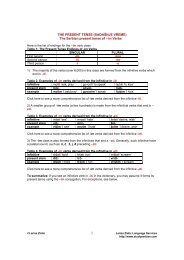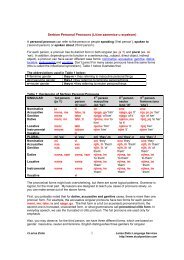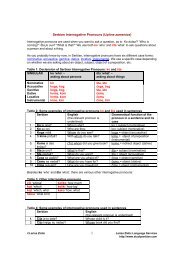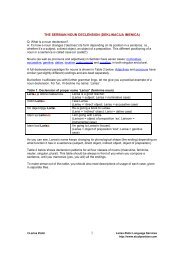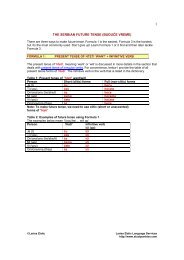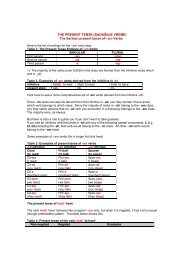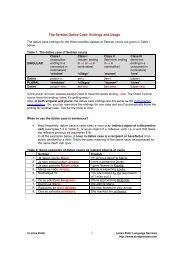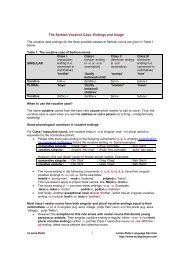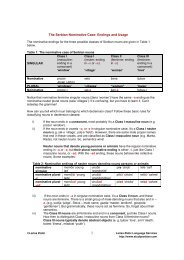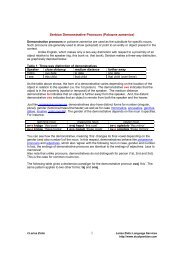The Serbian Accusative Case: Endings and Usage - Larisa Zlatic's ...
The Serbian Accusative Case: Endings and Usage - Larisa Zlatic's ...
The Serbian Accusative Case: Endings and Usage - Larisa Zlatic's ...
You also want an ePaper? Increase the reach of your titles
YUMPU automatically turns print PDFs into web optimized ePapers that Google loves.
<strong>The</strong> <strong>Serbian</strong> <strong>Accusative</strong> <strong>Case</strong>: <strong>Endings</strong> <strong>and</strong> <strong>Usage</strong><br />
<strong>The</strong> accusative endings for the three possible classes of <strong>Serbian</strong> nouns are given in Table 1<br />
below.<br />
Table 1: <strong>The</strong> accusative case of <strong>Serbian</strong> nouns<br />
SINGULAR Class I<br />
(masculine:<br />
ending in a<br />
consonant in<br />
nominative)<br />
‘window’<br />
Class I<br />
(neuter: ending<br />
in –o or –e in<br />
nominative)<br />
‘village’<br />
Class II<br />
(feminine: ending<br />
in -a in<br />
nominative)<br />
‘woman’<br />
Class III<br />
(feminine:<br />
ending in a<br />
consonant in<br />
nominative)<br />
‘love’<br />
<strong>Accusative</strong> prozor selo žen-u ljubav<br />
Jovana (John)<br />
PLURAL ‘windows’ ‘villages’ “women” ‘loves’<br />
<strong>Accusative</strong> prozor–e sel-a žen-e ljubav-i<br />
If you compare noun case endings in Table 1, you’ll notice the following pattern:<br />
1. <strong>The</strong> accusative case ending for Class I singular nouns is the same as the nominative<br />
case ending (zero ending). For example, ‘prozor’ <strong>and</strong> ‘selo’ are nominative forms <strong>and</strong><br />
also accusative forms.<br />
2. However, this rule doesn’t apply to animate nouns (nouns denoting humans <strong>and</strong><br />
animals). Rather, for animate masculine singular nouns, the accusative case ending is<br />
the same as the genitive case ending. For example, ‘Jovana’ is accusative case form <strong>and</strong><br />
also the genitive case form.<br />
When to use the accusative case in sentences?<br />
• Most frequently, accusative case is used when it is a direct object of a transitive verb.<br />
Table 2: Some examples of accusative nouns as direct objects of verbs<br />
<strong>Serbian</strong> English<br />
1. Ja perem prozor. I’m washing the window.<br />
2. Ja perem prozore. I’m washing the windows.<br />
3. Ja vidim moje selo. I see my village.<br />
4. Ja vidim moja sela. I see my villages.<br />
5. Ja znam Jovana. I know John.<br />
6. Ja čitam ove knjige. I’m reading these books.<br />
Table 3: A list of verbs that take direct object (accusative case)<br />
Ditransitive verbs<br />
(dative, accusative)<br />
Transitive verbs<br />
dati ‘give’ odbiti ‘refuse’ čekati ‘wait’ pevati ‘sing’<br />
deliti ‘share’ ostaviti ‘leave’ čitati ‘read’ pipati ‘touch’<br />
doneti ‘bring’ pisati ‘write’ čuti ‘hear’ pisati ‘write’<br />
dozvoliti ‘allow’ pokloniti<br />
‘donate’<br />
čuvati ‘keep’ pitati ‘ask’<br />
dugovati ‘owe’ poslati ‘send’ deliti ‘share’ piti ‘drink’<br />
govoriti ‘talk’ ponuditi ‘offer’ dobiti ‘get’ prati ‘wash’<br />
isplatiti ‘pay’ prodati ‘sell’ držati ‘hold’ primiti ‘receive’<br />
javiti ‘announce’ pozajmiti<br />
‘lend, borrow’<br />
gledati ‘watch’ saznati ‘find out’<br />
kazati ‘tell’ reći ‘tell’ jesti ‘eat’ svirati ‘play’<br />
©<strong>Larisa</strong> Zlatic 1 <strong>Larisa</strong> Zlatic Language Services<br />
http://www.studyserbian.com
obećati ‘promise’ verovati<br />
‘believe’<br />
kriti ‘hide’ tražiti ‘seek’<br />
odneti ‘take away’ kuvati ‘cook’ videti ‘see’<br />
mrzeti ‘hate’ voleti ‘love’<br />
naći ‘find’<br />
peći ‘bake’<br />
znati ‘know’<br />
For your convenience, I split the transitive verbs into ditransitive verbs (verbs taking two<br />
objects, one in the accusative <strong>and</strong> the other in dative case) <strong>and</strong> monotransitive verbs (verbs<br />
taking just one direct object in the accusative case).<br />
<strong>Accusative</strong> case is also used as an object of some prepositions:<br />
• prepositions: u ‘in’, na ‘on/at’, po ‘by, through’, za ‘for’, pred ‘in front’, nad ‘above, over’,<br />
pod ‘under’, među ‘among’, uz ‘alongside, by, upward,up’, niz ‘downward, down’, kroz<br />
‘through’. When used with these prepositions, the accusative case indicates the<br />
destination or goal of a movement or action expressed by a verb (examples 1-10) or<br />
it indicates time duration (examples 11-13).<br />
Table 4: Some examples of accusative nouns as objects of prepositions<br />
<strong>Serbian</strong> English<br />
1. Ja ulazim u kuću. I am entering the house.<br />
2. Ja idem u Beograd. I am going to Belgrade.<br />
3. Stavila je mleko u frižider. She put the milk in the regfrigerator<br />
4. Veverica se popela na krov. <strong>The</strong> squirrel climbed onto the roof.<br />
5. Išla sam po vodu. I went to (fetch) water.<br />
6. Ja idem za Ameriku. I am going to America.<br />
7. Došao je pred kuću. He came to the front of the house.<br />
8. Kiša se sručila nad grad. <strong>The</strong> rain poured on the town.<br />
9. Ja sam se sakrila pod drvo. I hid under the tree.<br />
10. Ona je izašla među ljude. She came out among the people.<br />
11. Milica se penje uz stepenice. Milica is climbing up the stairs.<br />
12. Milan silazi niz stepenice. Milan is going down the stairs.<br />
13. Voz prolazi kroz tunel. <strong>The</strong> train is passing through the tunnel.<br />
14. Dolazim na leto. I am coming in the summer.<br />
15. Došao je pred leto. He came before the summer.<br />
16. On čeka Mariju celu noć.* He’s been waiting for Maria all night.<br />
*Note, that in example 16, we have two nouns that have accusative case: Mariju <strong>and</strong> celu noć.<br />
<strong>The</strong> first noun is a direct object <strong>and</strong> the second one denotes duration of time.<br />
To ask questions about the accusative case (direct object), like ‘Whom/What do you see?’ you<br />
use the following interrogative pronouns in the accusative case:<br />
Koga ‘whom’ Šta ‘what’<br />
Table 5: Some examples of questions that ask about the accusative object<br />
<strong>Serbian</strong> English<br />
Question: Koga vidiš?<br />
Whom do you see?<br />
Answer: Vidim Milana.<br />
I see Milan.<br />
Quesiton: Šta vidiš?<br />
What do you see?<br />
Answer: Vidim prozor.<br />
I see the window.<br />
©<strong>Larisa</strong> Zlatic 2 <strong>Larisa</strong> Zlatic Language Services<br />
http://www.studyserbian.com
And now some exercises! If you get stuck or are not sure you got it right, please email me for<br />
help.<br />
Exercise 1 – Fill out the accusative case forms in the sentences below<br />
Using the nouns below (given in nominative, or dictionary form), please insert the appropriate<br />
accusative forms in the following sentences. For convenience, I have indicated which noun goes<br />
with which sentence.<br />
1., 2., 6. knjiga ‘book’ 6. kolač ‘cake’ 9. film ‘movie’<br />
3. sudovi ‘dishes’ 7. muzika ‘music’ 10. Kraljevo (town in Serbia,<br />
neuter gender)<br />
4. veš ‘laundry’ 8. Dragan (male name) 11. vreme ‘time’<br />
5. ručak ‘lunch’ 9. bioskop ‘cinema 12. kuća ‘house’<br />
1. Danas sam kupila ____________ Today I bought a book<br />
2. Hoću da čitam tu ______________ I want to read that book<br />
3. Ali, prvo moram oprati _______________ But, first, I have to wash the dishes<br />
4. I onda, moram oprati ________________ And then, I have to wash the laundry<br />
5. Onda moram skuvati <strong>The</strong>n, I need to cook lunch<br />
6. I moram peći And I have to bake a cake<br />
7. Kada čitam _______, volim da slušam________ While I read a book I like to listen to music<br />
8. Videla sam __________ danas. I saw Dragan today.<br />
9.. Uveče idem u __________ da gledam ______ In the evening, I am going to the cinema to<br />
watch a movie<br />
10. Sutra, putujem u _______ Tomorrow, I’m traveling to Kraljevo.<br />
11. Moram da stignem na _______. I have to arrive on time<br />
12. Dejan je prodao _______<br />
Dejan sold (his) house.<br />
Exercise 2 – Translate the following sentences<br />
For this exercise you need to know both the present tense <strong>and</strong> past tense. <strong>The</strong> boldface nouns<br />
require the accusative case. If you don’t have a bi-directional <strong>Serbian</strong>-English-<strong>Serbian</strong><br />
dictionary, you may go to the website: http://www.krstarica.com/dictionary/ to get the words you<br />
need for this exercise. Please note that for nouns, a dictionary will only give you the nominative<br />
case forms.<br />
1. He told me this story.<br />
2. <strong>The</strong>y waited for the train.<br />
3. I am going to Niš.<br />
4. <strong>The</strong> children came to the front of the movie theater.<br />
5. What did you buy?<br />
6. Whom did Marija meet?<br />
7. I’m going to Serbia in the winter.<br />
8. Bob was studying <strong>Serbian</strong>.<br />
9. Mary speaks <strong>Serbian</strong> well.<br />
©<strong>Larisa</strong> Zlatic 3 <strong>Larisa</strong> Zlatic Language Services<br />
http://www.studyserbian.com


